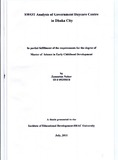SWOT analysis of government daycare centre in Dhaka city

View/
Date
2011-07Publisher
BRAC UniversityAuthor
Nahar, ZannatunMetadata
Show full item recordAbstract
This is a qualitative study conducted to analyze the Strength, Weakness, Opportunity
and Threat (SWOT) of government Day Care Centers (DCC) in Dhaka city. The
objectives of the study are to explore the strengths and examine the weaknesses of
sampled DCCs as well as identify the opportunities and determine threats to DCCs.
For conducting the study two governments DCCs were selected out of thirteen as case
examples. One DCC was in Mogbazar and other was in the Department of Women
Affairs (DWA) office premises in Dhaka city. The data were collected from two
Focus Group Discussions (FGDs) where nineteen parents of DCCs participated.
Additionally, two observations were conducted in two DCCs and five interviews were
conducted with five DCC staff (one caregiver, one teacher, one DCC officer, one
administrative officer and former Deputy Director) to learn in depth about the SWOT.
Participants were selected purposively from two locations. To conduct the FGD a
guideline manual and two checklists were developed for reliability and validity of the
observations. Five different questionnaires were developed to conduct the interviews.
The GOB run DCC is a 100 percent subsidized program which is its great strength.
This program is affordable for poor and middle income working parents who do not
have access to other DCCs. Parents of children attending Mogbazar are pleased with
the availability of these subsidized DCCs. They are able to work without concern
because they feel their children are in a safe and secure environment. Most of the
parents from both DCCs have voiced their satisfaction regarding the DCC services
such as accommodation, provision of more nutritious food, supply of toys, learning
kits and furniture. Parents are also satisfied regarding the care of their child in a safe
environment and the positive role of DCC officers. Parents of DWA day care have
voiced the need for a more flexible time schedule where children can attend the
program related to their needs. Furthermore, parents expressed the interest in a
quality school readiness program in DCCs and the need to increase the numbers of
caregivers. DCC staff has also identified some weaknesses such as lack of AC,
refrigerator, TV, and adequate staff, especially for the Mogbazar DCC. The researcher
has identified that facilities are not the same between the two DCCs. These need to
be maximized for all children. Furthermore, staff capacity is not being developed and
there is a lack of a DCC operational guide as well as a defined curriculum. Children
2
currently lag behind with regards to stimulation due to the lack of age specific
developmentally appropriate activities in the curriculum . Another serious concern is
that children aged 6 months to 3 are not developed properly due to lack of initiatives.
Some opportunities were identified through interviews and observations . DCCs need
a separate budget to develop partnerships with different sectors.
Moreover, the findings of this study also indicate that the few numbers of DCCs run
by the government is inadequate according to the need of working parents. A
significant number of children with working parents are at risk of not being able to
properly develop . Consequently, few numbers of DCC facilities exist in private and
public sectors through what is known as the Factory Act. All sectors need to attend to
DCCs, as they contribute to the GDP. A further study with a representative sample is
suggested to generalize the findings.
